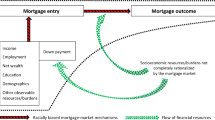Abstract
Homeownership, a primary component of household wealth, confers benefits not just in terms of the value of home equity itself, but also the tax benefits and inflation protection associated with owning property. The 1990s represented a booming time in the economy and record low interest rates which allowed homeownership to become more available to more people than ever. As a result, the US housing market experienced significant growth and home values began to soar in part due to rising incomes. However, this period of rapid expansion in the housing market was followed by a rapid decline, precipitated by the recession, as home values began to plummet and foreclosures steadily increased. This study examines the impact that recent macroeconomic fluctuations had on the likelihood of homeownership for African American women compared to their white counterparts. Using data from the American Housing Survey (1997–2009), this tenure spatial analysis used a logistic regression model to examine the odds in favor of homeownership during economic fluctuations along with taking into consideration other important determinants. The empirical results show that there are significant differences in the likelihood of homeownership between African American women and white females.
Similar content being viewed by others
References
Alba R, Logan J. Assimilation and stratification in the homeownership patterns of racial and ethnic groups. Int Migrat Rev. 1992;26(4):1314–41.
Austin A. Reversal of fortune: economic gains of the 1990s overturned for African-Americans from 2000–07. Washington DC: Economic Policy Institute Publication; 2008.
Carey N. Race-based predatory lending fueled housing crisis; 2010. Retrieved March 2011 from http://www.capitolhillblue.com/node/33344.
Charles K, Hurst E. The transition to home ownership black- white wealth gap; University of Michigan and University of Chicago Working Paper; 2001.
Conrad D, Alleyne B. The spatial impact of revitalization on the likelihood of homeownership: a look at Washington DC. Commun Dev: J Commun Dev Soc. 2011;42(1):34–55.
Cottrell M. How segregation caused the housing crisis; 2010. Retrieved March 2011 from http://www.chicagonow.com/blogs/chicago-muckrakers/2010/10/how-segregation-actually-caused-the-housing-crisis.html.
Darity, W. “Stratification Economics: The Role of Intergroup Inequality.” Journal of Economics and Finance. 2005;29(2):144–53.
DiPasquale D, Glaeser EL. Incentives and social capital: Are homeowners better citizens? Journal of Urban Economics. 1999;45(2):354–384.
Emerson M, Yancey G. Does race matter in residential segregation? Exploring the preferences of white Americans. Am Sociol Rev. 2001;66:922–35.
Estrada V. Getting and keeping a home: a life table analysis of homeownership transitions in the US, 1969–2003. Los Angeles: International Sociological Association Research Committee on Social Stratification and Mobility; 2005.
Gujarati DN. Basic econometrics. 3rd ed. New York: McGraw-Hill; 1995.
Jourdain-Earl M. The foreclosure crisis and racial disparities in access to mortgage credit 2004–2009; 2011. http://www.compliancetech.com/files/The%20Foreclosure%20Crisis%20and%20Racial%20Disparities.pdf Retrieved March 2011.
Kain J, Quigley J. Housing market discrimination, homeownership and savings behavior. Am Econ Rev. 1975;62(3):263–77.
Kochhar R, Gonzaolez-Barrea A, Dockterman D. Through boom or bust, minorities, immigrants and homeownership; 2009. Pew Research Center Publications. www.pewresearch.org. Retrieved February 2010.
Leigh W, Huff D. African Americans and homeownership: separate and unequal, 1940 to 2006. Washington, DC: The Joint Center for Political and Economic Studies; 2007a.
Leigh W, Huff D. African Americans and homeownership: the subprime lending experience, 1995 to 2007. Washington, DC: The Joint Center for Political and Economic Studies; 2007b.
Li MM. A logit model of homeownership. Econometrica. 1977;45(5):1081–97.
Massey DS, Denton NA. American apartheid: Segregation and the making of the underclass. Harvard University Press, Cambridge, Mass; 1993.
Myers S, Chung C. Racial differences in homeownership and home equity among pre-retirement aged households. Gerontologist. 1996;36:356–60.
Shapiro T. The importance of assets. In: Shapiro T, Wolff E, editors. Assets for the poor. New York: Russell Sage; 2001.
Sherraden M. Asset-building policy and programs for the poor. In: Shapiro T, Wolff E, editors. Assets for the poor. New York: Russell Sage; 2001.
Stern M. The Un(credit) worthy poor. In: Shapiro T, Wolff E, editors. Assets for the poor. New York: Russell Sage; 2001.
Sykes L. A home of her own: an analysis of asset ownership for non-married black and white women. Soc Sci J. 2005;42:273–84.
Turner MA, Skidmore F. Mortgage lending discrimination: a review of existing evidence. New York: The Urban Institute; 1999.
Yinger J. Sustaining the fair housing act. Cityscape. 1999;4:93–106.
Author information
Authors and Affiliations
Corresponding author
Additional information
This paper was prepared for presentation at “The Invisible Woman: The Status of and Challenges facing Black Women” Conference at Bennett College for Women, March 18–19, 2010.
About this article
Cite this article
Conrad, D.A., Brown, L.N. The Impact of Macroeconomic Fluctuations on the Likelihood of African American Female Homeownership. Rev Black Polit Econ 39, 299–309 (2012). https://doi.org/10.1007/s12114-011-9113-3
Published:
Issue Date:
DOI: https://doi.org/10.1007/s12114-011-9113-3




